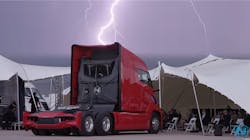Nikola, Tesla announce competing truck factories in the Southwest
When the West was still wild and intermodal transport comprised trains and literal horsepower, some folks did indeed settle their differences with a duel. That spirit appears alive and well still, as within about 24 hours of each other, dueling zero-emission truck makers Tesla and Nikola shot off big news that will keep their rivalry strong for the foreseeable future. Nikola broke ground on its Coolidge, Ariz., plant that will produce the Nikola Two and Nikola Tre Class 8 trucks, while Tesla broke the news on a July 22 Q2 investor call that the Tesla Semi and Cybertruck will be assembled at a new Gigafactory in Austin.
In terms of real-world testing, the Semi has the edge, with the battery-electric vehicle (BEV) seen in chance encounters on California highways and is believed to have undergone winter testing at Tesla’s Alaska facility.
Not much was said about “Giga Texas,” other than CEO Elon Musk explaining it will be on a “stunning” 2,000 acre “ecological paradise” near the Colorado River. Despite being very secretive about the inner working of Tesla factories, Musk said the grounds, which will have hiking/biking trails and a boardwalk, will be open to the public. Tesla said the plant will employ 5,000 people with a starting wage of $15/hour.
Nikola has performed one beer delivery with Anheuser-Busch in St. Louis, and released in-depth under-the-hood videos of its fuel cell electric truck (FCET) technology and some shorter demos, such as brake tests.
From a production standpoint, Nikola drew first, sinking shovels into the desert soil on July 23, just before a thunderstorm came rolling through.
The company also expects to be the first to have a zero-emission truck with ranges in excess of 300 miles. Because of its FCET technology, the company seems to have captured lightning in a bottle. The $600 million site is located off U.S. Highway 87 at East Houser Road and Vail Road.
Nikola CEO Mark Russell called it “an event important to the history for mankind.”
The truck has not proven itself, and the $1-per-mile lease plan sounds too good to be true, but the premise sounds good. Paired with the solar fields planned to adjoin the Coolidge plant — located in a little town of 13,000 an hour south of Phoenix — Nikola may have a truly sustainable greenfield operation. Nikola founder and chairman Trevor Milton said the plant would produce “zero emissions from production to consumption.”
It should be noted that mining lithium for the batteries and producing solar panels require extensive energy generation and do produce emissions.
“One of the hardest challenges we’re going to have to solve as a species on this planet is how to stop digging up and burning fossil fuels to power our lives,” Russell said. “The bigger something is, the harder it is to move with zero emissions.”
With this first plant, Nikola hopes to meet this challenge head on. The first phase, erecting an assembly building, is expected to be complete in the next 12 months, though Mark Duchesne, Nikola global head of manufacturing, said at the event he would aim closer to six months.
During Phase 2, which would finish 12 to 18 months after Phase 1, the plant would expand to about 1 million square feet, and in the following Phase 3 weld and paint shops would move in. At full production, Nikola has stated the factory will produce 35,000 trucks per year. This will not include either the BEV or FCET versions of Nikola’s Badger pickup truck, which will be manufactured by a yet-to-be-named automotive partner.
The reason is because high-volume manufacturing is really hard, as Tesla had to learn the hard way with its Model 3 production. Production tents were set up in the Fremont, Calif., parking lot to handle the backlog of assemblies in 2018. While Nikola is trying something very new with its hydrogen-powered trucks, they are relying on the expertise of European cabover engine maker Iveco, owned by CNH Industrial.
Milton acknowledged that they needed Iveco’s 30 years of chassis expertise and billions of dollars of platform development to be able to push trucks out by the end of next year. He also cited Tier-One truck suppliers Bosch, Meritor and Wabco as instrumental in the Nikola Two and Tre development.
"This has been an incredible journey for Nikola Corporation,” Milton said. “We started in our basement six years ago, and now we are kicking off this 1 million-square-foot manufacturing facility."
About the Author
John Hitch
Editor
John Hitch is the editor-in-chief of Fleet Maintenance, providing maintenance management and technicians with the the latest information on the tools and strategies to keep their fleets' commercial vehicles moving. He is based out of Cleveland, Ohio, and was previously senior editor for FleetOwner. He previously wrote about manufacturing and advanced technology for IndustryWeek and New Equipment Digest.

